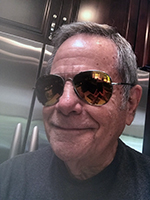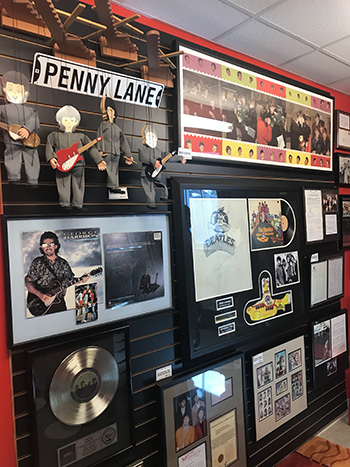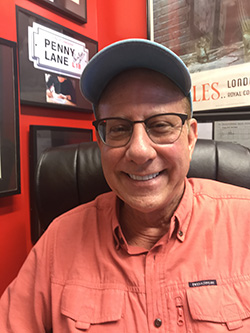By Bruce Lowitt


DUNEDIN, Florida — Bobby Entel didn’t watch the Beatles’ Feb. 9, 1964 performance on the Ed Sullivan Show. He was 7 years old at the time and in bed. He never saw them in person. He was 11 when they recorded their rooftop album on Jan. 30, 1969, their last time together. He never visited Liverpool, their birthplace, and never crossed Abbey Road when he was a medical student and visiting professor in London in the 1990s.
He has more than made up for those, um, failings. When he’s not Robert J. Entel, MD, MPH, FACR, practicing radiology at Mease hospitals in Dunedin and Countryside and Morton Plant hospitals in Clearwater and New Port Richey, he can often be found in Penny Lane at 730 Broadway in Dunedin, surrounded by an astonishing collection of Beatles memorabilia.
It’s his museum, dedicated to the Fab Four, which opened about three and a half years ago. More to the point, it’s where he goes to escape the realities of life.
“I’ve been in practice for 32 years. I love practicing medicine. It’s my pride and joy. But it’s very stressful and there comes a time when you have to slow down and I’ll certainly be spending more time in the Beatles environment here,” Entel said, seated in a nook in Penny Lane while “Something” from the Abbey Road album played softly in the background and a pair of nearby tourists studied a guitar signed by Paul McCartney.
“This is my happy spot, my relief area,” Entel said. “It’s a very fulfilling hobby and a labor of love.” So much so that he couldn’t imagine charging admission. “I didn’t want to see people with kids turning away because of a fee,” he said. The museum was set up as a non-profit in 2018.
There are several Beatles museums in England and one in Holland. But except for a floor dedicated to them at the Rock and Roll Hall of Fame in Cleveland, Entel believes his is the only permanent Beatles exhibit in the United States. “In the years we’ve been open, nobody’s ever come in and said, ‘You should see the one in New York or Wyoming.’
Penny Lane isn’t the easiest place to find. You’ll see 730 on the front of a building on Broadway but you’ll have to walk around to the back, where you’ll see a stairway to the second floor (there’s also an elevator). That brings you to the doors to the Stirling Art Studios and Gallery. A short walk in the gallery and a right turn will take you to the museum entrance with life-sized cutouts of the Beatles welcoming you.

Entel chose the site because Dunedin “is where I grew up. I sailed my pram here. I work at the hospital here. I still get my hair cut at the same barber shop I went to. What is now city hall used to be the Dunedin public library, where I used to study. I used to live a couple of miles down the road.”
Sandwiched between Clearwater and Palm Harbor along the bay, Dunedin – especially its Main Street – has maintained the small-town appeal that first drew his parents, Dr. Irwin and Syd Entel from New York here in the first place.
Entel has participated in humanitarian projects in Latin America and the Middle East, has organized several annual medical missions to Cuba, is on the board of the Jewish National Fund of Tampa Bay, and has been a visiting professor in England and other nations.
England is where Robert Entel’s fascination with the Beatles began in earnest.
“My interest in them evolved from just liking their music to being intrigued with their cultural influence, the impact they had on politics, on hair styles, on clothing and on the music world,” he said. “It happened for me over a period of time … and I didn’t start collecting anything until I was in my 20s and spending a few months as a medical student in London.
“I went to the Portobello Road Market and there was a hippyish guy with an American accent who had a card table set up and he was selling some Beatles stuff – coasters and ashtrays and records. Small items, only a couple of pounds each.”
Entel bought a few things, brought them home to Dunedin, put them in a drawer and started going to flea markets and antique stores in the Tampa Bay area, buying more lower-end items – buttons, pins, records.
“I’d also meet people who’d say, ‘I know a dude who’s got a bunch of Beatles stuff he wants to move out. Want his number?’ And I’d say, ‘Sure,’ and I’d offer maybe a hundred bucks for a whole Care Package of junk that maybe had a few good items.”
By the time Entel was in his 30s, his cabinet was overflowing with Beatles stuff. He started decorating his walls and the more he put on display the more enthusiastic he got. Now, he was hitting online auction houses like Heritage and Sotheby’s, not to mention eBay, and began concentrating more on the rarity and cost of the items, “to the point where I went from pins and buttons and posters to signed guitars and their clothing. I also have pieces of their hair.”
About five years ago, as stuff piled up in his closets and bedroom, friends started suggesting he open a museum. “I’d tell them, ‘I’m a doctor. What do I know about a museum?’” But he knew George Ann Bissett, then the director of the Dunedin Fine Art Center (now its president and CEO) whose husband, Colin, a native of Liverpool who “really had a sense of the Beatles’ early days,” Entel said.
Colin Bissett is now the curator of Penny Lane and a museum guide.
“It covers a lot of time and there’s a lot of stuff from the Beatles earliest times,” Bissett said of Entel’s museum. “I went to school with Rory Best, Pete Best’s brother (Pete was the Beatles’ drummer for two years before being replaced by Ringo Starr on Aug. 19, 1962) and we used to go see them. When I say ‘see them,’ you’d walk into the Cavern Club and they’d be smoking and having a cup of coffee, a cup of tea. It wasn’t as though they were performing every time. They were nothing like they turned out to be. They were just local guys.”
Of Pete Best’s time with the Beatles, Bissett said that on the night Best was replaced, a lot of his fans protested the decision during their performance at the Cavern Club and one of them gave George Harrison a black eye.
Penny Lane is 600 square feet. It is open 11 a.m. to 3 p.m. Thursday through Sunday and contains about 1,000 items, perhaps a quarter of Entel’s collection.
“There are times I’ll see something I’ve looked at a hundred times and I’ll think, ‘Wow, I didn’t even notice I had that.’ It’s a visual overload but I kind of want it to be that way. … What I love the most is the people who come in and tell their stories, their memories.”
“I have stuff at home that I can’t display here because it’s a small place. I have Ringo Starr’s drum set that he played on a Super Bowl commercial. I have Beatles pinball machines, Beatles juke boxes, a couple of Beatles slot machines from Las Vegas.” Not to mention Beatles puppets and marionettes, gold and platinum records, posters, lunchboxes, toys, a serape worn by Ringo, and John Lennon’s electric razor and the TWA bag he put it in when he traveled.
And there’s this: “There was a gentleman, Jeff Levy, that lived in Dunedin who played drums in a group called David Peel and the Lower East Side that John Lennon produced when he was in New York,” Entel said. “And Jeff said he was walking in Central Park with John and said, ‘Can I have those sunglasses?’ and John said, “No, I don’t want to give them away.’ Then he said, ‘Well, these are nonprescription.’ And we have the sunglasses and I have a video of Jeff describing how he got them.”
As with just about any museum, Penny Lane sells T-shirts and caps, pins and buttons and coasters and other souvenirs – but none of the collectibles is for sale. In fact, Entel no longer owns any of it. He donated the objects, collected over 40 years, to the museum.
“We have about a thousand visitors a month,” he said.
Now Entel is looking for a larger space, “maybe a place where we could show films. Maybe a kitchen, a space for a band.” He said he’s been contacted by potential sites in St. Petersburg, Clearwater, Safety Harbor and Washington, D.C. “But I want to stay in Dunedin. It’s where I grew up and downtown is charming.”
*
A version of this story appeared in the Jewish Press of Pinellas County, Florida. Author Bruce Lowitt is a freelance writer based in Clearwater, Florida.